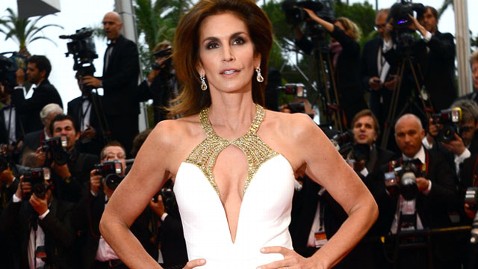Cindy Crawford Still Struggles With Body Image

Cindy Crawford, who helped define the term "supermodel," says she still frets over her figure.
The 47-year-old modeling legend admitted in a recent interview with Net-a-Porter's The Edit magazine that she struggles with body-consciousness and set a goal for herself to "come to terms" with her looks and achieve self-acceptance by the age of 50.
"I'm a normal woman, sometimes I feel pretty good and some days I'm like, 'Oh, my God, nothing fits,'" Crawford told the magazine. "My new resolution is that by the time I am 50, I want to have come to terms with my body."
But when it comes to dieting, Crawford didn't seem so keen.
"Because for me, being five pounds lighter, what it would cost me. … I don't want to be like, 'Oh, no, no salad dressing, no wine, no fun.'"
The mother of two, who has long been known for her voluptuous figure, said these days she favors what she dubbed the "Malibu mom" look, wearing "jeans, a top or something that's one step above from a T-shirt, like a little silk blouse, then a leather jacket over that."
Crawford, who burst onto the modeling scene in the '80s, paved the way for many of today's supermodels to have successful careers. Over the years, several models have voiced their body-image concerns and pressures from the fashion industry to appear perfect at all times.
Some models have taken a stand to embrace their natural look. Victoria's Secret model Gisele Bundchen last week told fashion blog Fashionista that she was forgoing makeup, professional hairdressing and digital touch-ups for her latest ad campaign for BLK DNM, saying that "our imperfections are what make us unique and beautiful."
Nonetheless, both Crawford and Bundchen became top-earning models because of their seemingly flawless physiques.
Crawford credited her willingness to be bold with her career, to push boundaries and do things professional models had never done before, such as posing for "Playboy" or appearing on "MTV," for helping her become a success.
"I thought, 'I am going to take advantage of this moment, do my own thing,'" Crawford said. "I think some of the young girls saw me as someone who used the business back, not just getting eaten up by it. It's like women's rights or everything else, you break the glass ceiling a little each time."